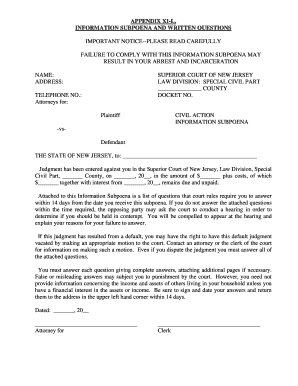
The Court and the Police connect with the Community during National Night Out.ĪDMINISTRATIVE ORDER 2022-001 Fairfield Municipal Court Hires MagistrateĬharles C. Campbell Elected President of The Nami National Board Of Directors 1:38-7(c) that states, “I certify that confidential personal identifiers have been redacted from documents now submitted to the court, and will be redacted from all documents submitted in the future in accordance with Rule 1:38-7(b).Deputy Bailiff Position Current NAMI Ohio Board Chair, Joyce A.

The first filed pleading of any party in an action in the Chancery Division, General Equity or in the Law Division, Special Civil Part shall include a certification of compliance as required in R. A fee may be charged for the cost of redacting Social Security numbers from such records.Ĭompliance with this Rule must be certified to by the attorney.Ĭertification of Compliance with Rule 1:38-7(c). Any request for the mass release, in bulk, of electronically stored or microfilmed records containing Social Security numbers must be submitted to the Administrative Director of the Courts. (f) Redaction of Social Security Numbers from Records in Bulk.
NJ COURT FILED DOCUMENTS REPORT LICENSE
This redaction requirement, however, does not apply to driver’s license numbers that the New Jersey Motor Vehicle Commission requires in documents pertaining to the suspension and reinstatement of licenses. 1:38-7(a) are required by statute, rule, or court order to be included in documents or pleadings, such identifiers shall be redacted before public inspection is permitted. When confidential personal identifiers as defined in R. (e) Redaction of Required Personal Identifiers. No other personal identifiers shall be included. Applications for any writ, order, or judgment issued by the court involving a judgment debtor may include the judgment debtor’s name(s), address, date of birth, the last four digits of active financial account numbers, and the last four digits of the individual’s Social Security number. 4:5-1(b)(3), “I certify that confidential personal identifiers have been redacted from documents now submitted to the court, and will be redacted from all documents submitted in the future in accordance with Rule 1:38-7(b).” (3) In all criminal matters, the judge shall inform both parties at the time of the defendant’s arraignment status conference that confidential personal identifiers must be redacted from any documents submitted to the court as provided in R. (2) In General Equity and Special Civil Part matters, where no Case Information Statement is required, parties shall include the following language in the first filed pleading as provided in R.
NJ COURT FILED DOCUMENTS REPORT TRIAL
(1) In every trial Division of the Superior Court where a Case Information Statement is required, parties shall certify in the Case Information Statement that all confidential personal identifiers have been redacted and that subsequent papers submitted to the court will not contain confidential personal identifiers in accordance with the provisions of this rule. 1:38-7(a) in any document or pleading submitted to the court unless otherwise required by statute, rule, administrative directive, or court order provided, however, that an active financial account number may be identified by the last four digits when the financial account is the subject of the litigation and cannot otherwise be identified. A party shall not set forth confidential personal identifiers as defined in R.

(b) Prohibition on Submission of Confidential Personal Identifiers to the Court.

A confidential personal identifier is a Social Security number, driver’s license number, vehicle plate number, insurance policy number, active financial account number, or active credit card number. (a) Definition of Confidential Personal Identifiers. Court Rule 1:38-7 – Confidential Personal Identifiers Today, in New Jersey, unless otherwise directed, a party may not include any personal identifiers in any document filed with the court. New Jersey has sought to remedy this problem of having confidential personal identifiers becoming part of the public record and has enacted a law rectify this situation. This information was included in documents that were filed with the court, and, thus, became public documents. This could include, for example, social security numbers or license pate numbers.

In the past, when an injured party filed a lawsuit seeking redress for injuries sustained, they were required to reveal certain information to the adverse party.


 0 kommentar(er)
0 kommentar(er)
